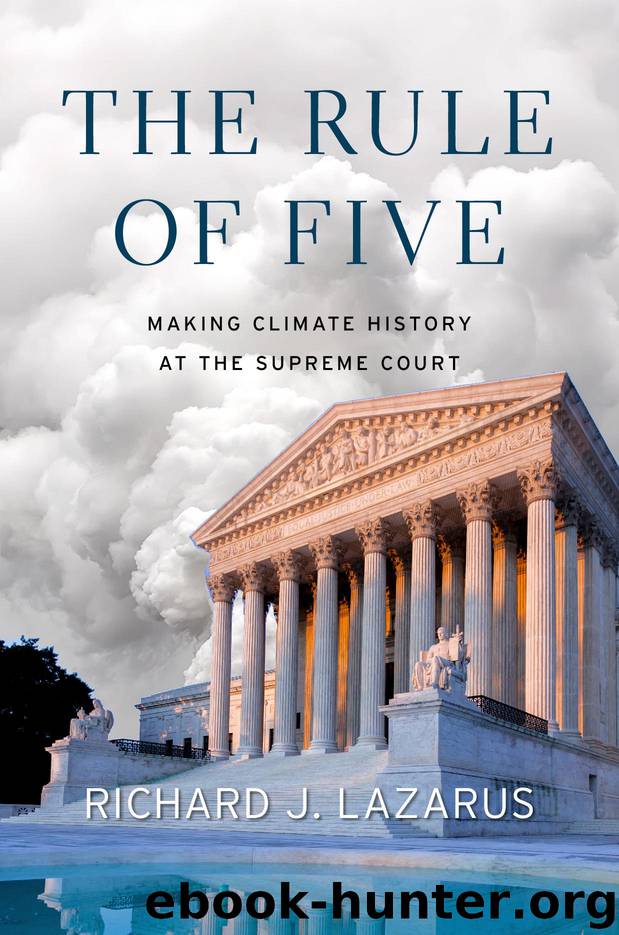The Rule of Five by Richard J. Lazarus

Author:Richard J. Lazarus
Language: eng
Format: epub
Publisher: Harvard University Press
15
A Hot Bench
As Jim Milkey began to speak, those in the Supreme Court Bar in the front of the courtroom shifted forward ever so slightly in their seats, eager to see which Justice would be the first to interrupt and ask a question. Most looked immediately to the one known for sporting a Cheshire-cat-like grin before ambushing his prey.
Justice Antonin Scalia had, after all, transformed oral argument. The number of questions the Justices asked almost doubled immediately after Scalia joined the Court in September 1986, increasing to an average of 104 questions per hour-long argument during Scalia’s first year. By 2005, the year before Massachusetts was argued, the average number of questions asked by the Justices had ballooned to a whopping 156.1
From the minute he joined the Court, Scalia made his presence known. During the very first argument on his very first day on the bench, Scalia asked twenty-eight demanding questions.2 And during one two-week period that Supreme Court Term, which runs October to October, he asked 30 percent of all the questions posed by the Justices. In case after case, Scalia peppered arguing counsel with questions, prompting Justice Lewis Powell, an old-school Virginian who was well known for his polite demeanor, to quip to Justice Thurgood Marshall: “Do you think he knows the rest of us are here?”3
As a former law professor at the Universities of Virginia and Chicago, known for his lively questioning of students in the classroom, aggressive interrogations came naturally to Scalia. But this was more than just the judicial equivalent of classroom banter designed to ensure a full airing of the legal issues presented in a case. It was strategic.
Scalia had discovered upon joining the Court that his opportunity to influence the other Justices was extremely limited. By tradition, the Justices do not discuss with each other a case before oral argument. As described by Justice Kennedy, “Before the case is heard, we have an unwritten rule: We don’t talk about it with each other.”4 Even at the conference held one to two days after the argument, where they formally voted, there was no meaningful discussion. One at a time, each Justice would speak without interruption and announce his or her vote, along with a summary explanation. To his disappointment, the conference was “not really an exercise in persuading each other.”5 Worse still, because Scalia was the most junior Justice, he was the last to speak—before he had uttered a word, all the other Justices had already announced their vote.6
So Scalia pivoted to the oral argument, the first—and by far the longest—time the Justices ever spoke about a case in one another’s company. As explained by Chief Justice Roberts, “We come to it cold as far as knowing what everybody thinks, and so through the questioning, we are learning for the first time … how [the other Justices] view the case and that can alter how you view it right on the spot.”7 To Scalia, the lesson was obvious. If he could use those sixty minutes wisely, he could press his views on the case to his colleagues before the conference vote.
Download
This site does not store any files on its server. We only index and link to content provided by other sites. Please contact the content providers to delete copyright contents if any and email us, we'll remove relevant links or contents immediately.
Man-made Catastrophes and Risk Information Concealment by Dmitry Chernov & Didier Sornette(6019)
The Revenge of Geography: What the Map Tells Us About Coming Conflicts and the Battle Against Fate by Kaplan Robert D(4077)
Zero Waste Home by Bea Johnson(3839)
COSMOS by Carl Sagan(3625)
Good by S. Walden(3560)
In a Sunburned Country by Bill Bryson(3543)
The Fate of Rome: Climate, Disease, and the End of an Empire (The Princeton History of the Ancient World) by Kyle Harper(3067)
A Wilder Time by William E. Glassley(2863)
Camino Island by John Grisham(2799)
Organic Mushroom Farming and Mycoremediation by Tradd Cotter(2692)
The Ogre by Doug Scott(2684)
Human Dynamics Research in Smart and Connected Communities by Shih-Lung Shaw & Daniel Sui(2502)
Energy Myths and Realities by Vaclav Smil(2493)
The Traveler's Gift by Andy Andrews(2462)
9781803241661-PYTHON FOR ARCGIS PRO by Unknown(2372)
Inside the Middle East by Avi Melamed(2357)
Birds of New Guinea by Pratt Thane K.; Beehler Bruce M.; Anderton John C(2255)
A History of Warfare by John Keegan(2244)
And the Band Played On by Randy Shilts(2210)
